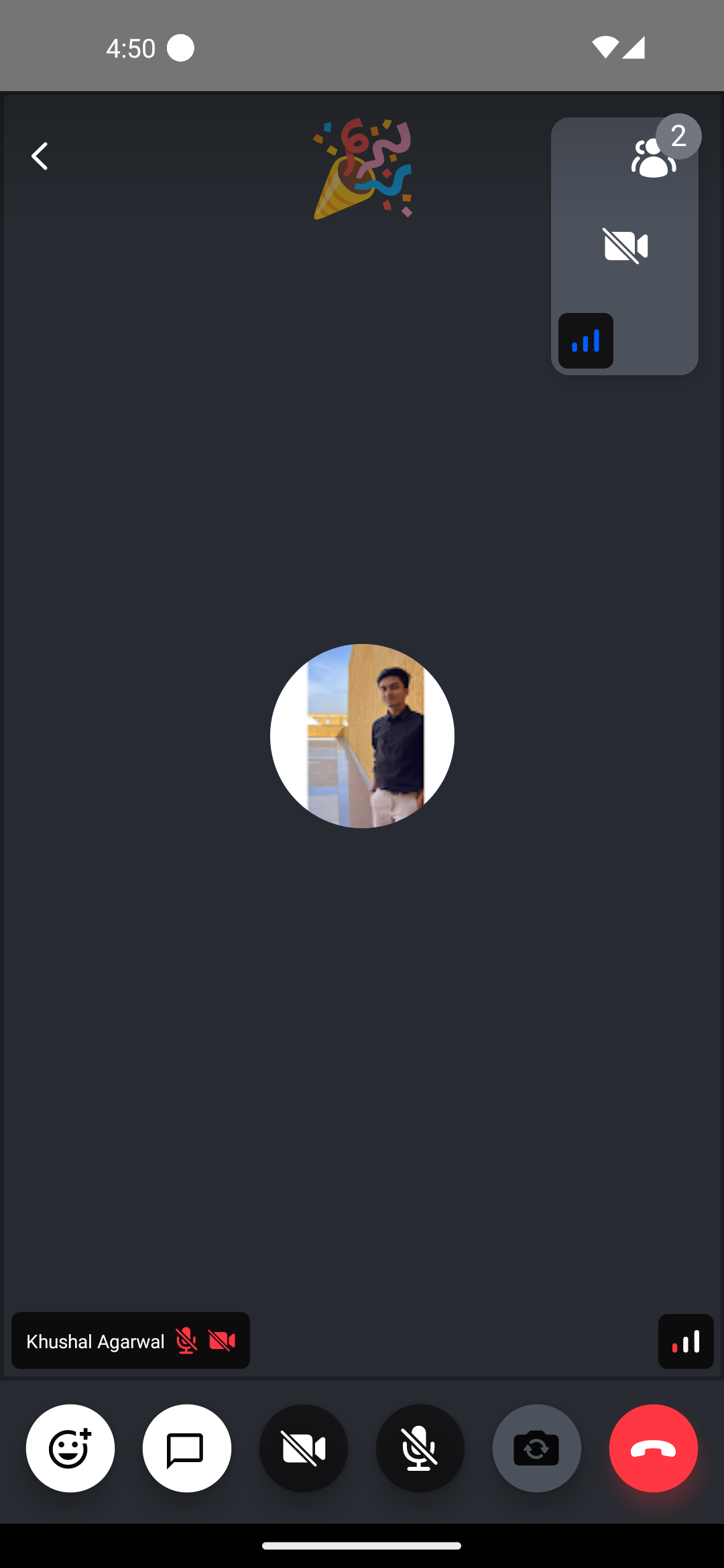Reactions
Reactions are a great way to communicate between users when you have limited speakers or even if the users are in mute mode.
You can send an emoji to the call with the code below:
const reaction = {
type: 'reaction',
emoji_code: ':like:',
custom: {},
};
const call = useCall();
call?.sendReaction(reaction);
Reaction Mapper
Stream Video React Native SDK provides the default reaction mapper to display proper emojis. It basically handles a couple of default emojis, but you can customize those emoji maps by building your own mapper and passing it to supportedReactions prop of CallContent.
Once you pass the reaction map here, it is automatically handled in the ParticipantReaction component.
import {
StreamReactionType,
Call,
CallContent,
StreamCall,
} from '@stream-io/video-react-native-sdk';
const reactions: StreamReactionType[] = [
{
type: 'reaction',
emoji_code: ':smile:',
custom: {},
icon: '😊',
},
{
type: 'raised-hand',
emoji_code: ':raise-hand:',
custom: {},
icon: '✋',
},
{
type: 'reaction',
emoji_code: ':fireworks:',
custom: {},
icon: '🎉',
},
];
const VideoCallUI = () => {
let call: Call;
// your logic to create a new call or get an existing call
return (
<StreamCall call={call}>
<CallContent supportedReactions={reactions} />
</StreamCall>
);
};
You can also use it in the ReactionsControls so as to list the supported reactions in the call controls and use them to send it.
import {
StreamReactionType,
Call,
CallContent,
StreamCall,
ReactionsButton,
} from '@stream-io/video-react-native-sdk';
import { View, StyleSheet } from 'react-native';
const reactions: StreamReactionType[] = [
{
type: 'reaction',
emoji_code: ':smile:',
custom: {},
icon: '😊',
},
{
type: 'raised-hand',
emoji_code: ':raise-hand:',
custom: {},
icon: '✋',
},
{
type: 'reaction',
emoji_code: ':fireworks:',
custom: {},
icon: '🎉',
},
];
const CustomCallControls = () => {
return (
<View style={styles.buttonGroup}>
<ReactionsButton supportedReactions={supportedReactions} />
{/* Other Call Controls */}
</View>
);
};
const VideoCallUI = () => {
let call: Call;
// your logic to create a new call or get an existing call
return (
<StreamCall call={call}>
<CallContent CallControls={CustomCallControls} />
</StreamCall>
);
};
const styles = StyleSheet.create({
buttonGroup: {
flexDirection: 'row',
justifyContent: 'space-evenly',
paddingVertical: 10,
},
});
Custom Participant Reaction

You can customize the participant reaction by implementing your own reaction component and passing it to the CallContent component.
import { ParticipantReactionProps } from '@stream-io/video-react-native-sdk';
import { StyleSheet, Text, View } from 'react-native';
const CustomParticipantReaction = ({
participant,
supportedReactions,
}: ParticipantReactionProps) => {
const { reaction } = participant;
const currentReaction =
reaction &&
supportedReactions.find(
(supportedReaction) =>
supportedReaction.emoji_code === reaction.emoji_code,
);
return (
<View style={styles.background}>
<Text style={styles.reaction}>{currentReaction?.icon}</Text>
</View>
);
};
const styles = StyleSheet.create({
background: {
alignItems: 'center',
justifyContent: 'center',
zIndex: Z_INDEX.IN_FRONT,
},
reaction: {
fontSize: 50,
},
});
Final Steps
Now this can be passed to the ParticipantReaction prop of the CallContent component, as follows:
import {
Call,
CallContent,
StreamCall,
} from '@stream-io/video-react-native-sdk';
const VideoCallUI = () => {
let call: Call;
// your logic to create a new call or get an existing call
const reactions: StreamReactionType[] = [
{
type: 'reaction',
emoji_code: ':smile:',
custom: {},
icon: '😊',
},
{
type: 'raised-hand',
emoji_code: ':raise-hand:',
custom: {},
icon: '✋',
},
{
type: 'reaction',
emoji_code: ':fireworks:',
custom: {},
icon: '🎉',
},
];
return (
<StreamCall call={call}>
<CallContent
supportedReactions={reactions}
ParticipantReaction={CustomParticipantReaction}
/>
</StreamCall>
);
};
To get the participant data, you can use the following hooks from the useCallStateHooks:
useParticipantshook that provides all the necessary details of all the participants.useRemoteParticipantshook that provides all the details of the participants other than the local participant.useConnectedUseroruseLocalParticipantprovides the details of the local or connected participant.